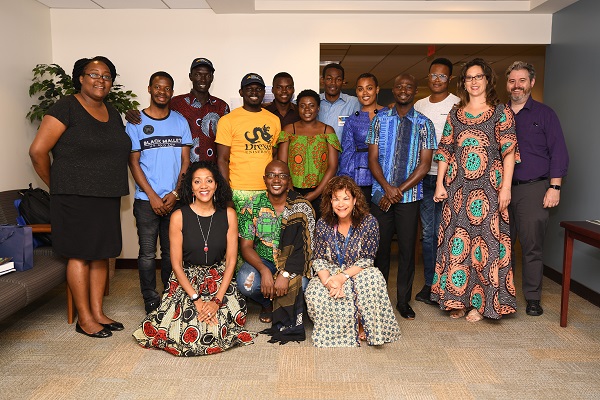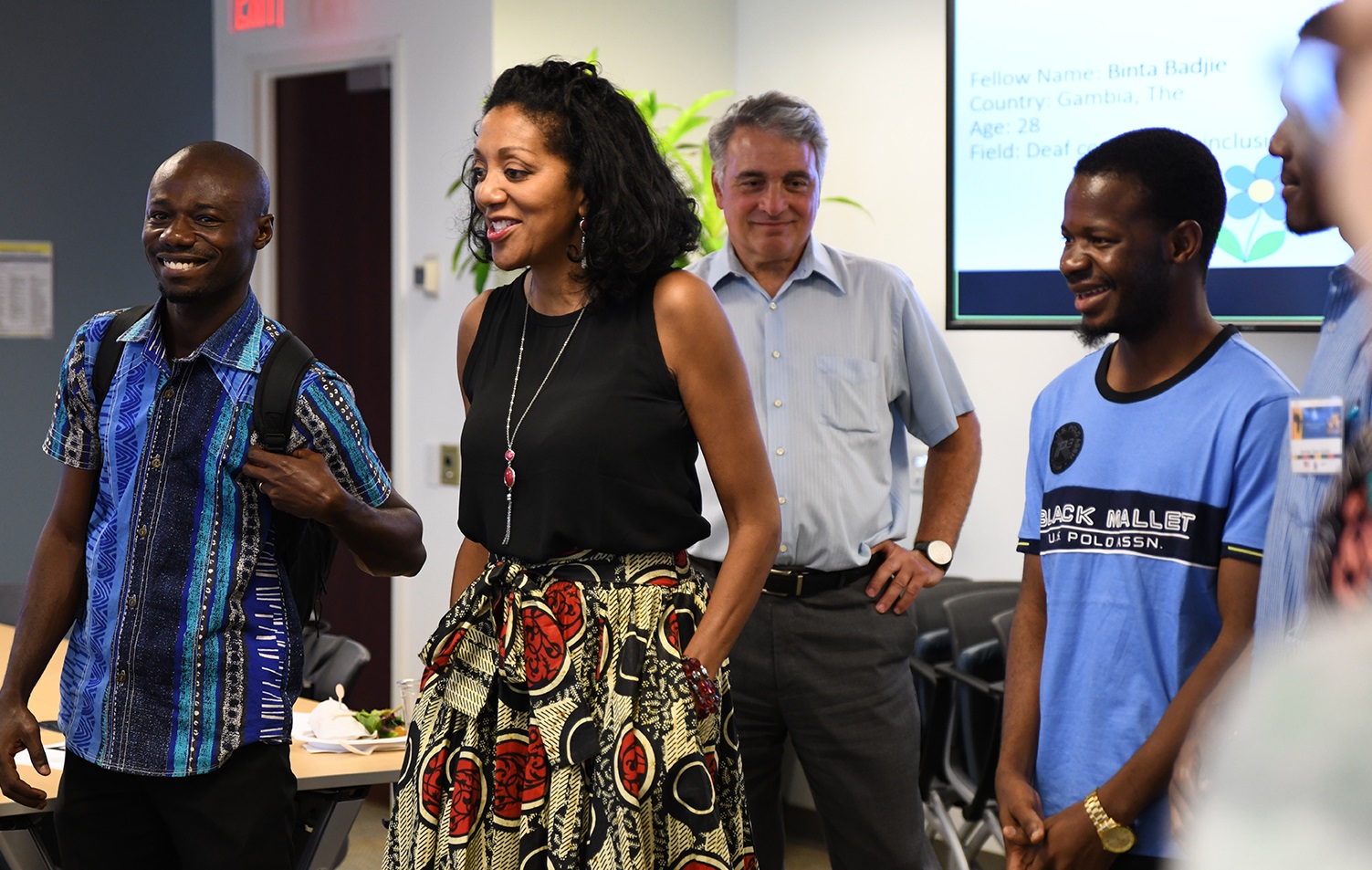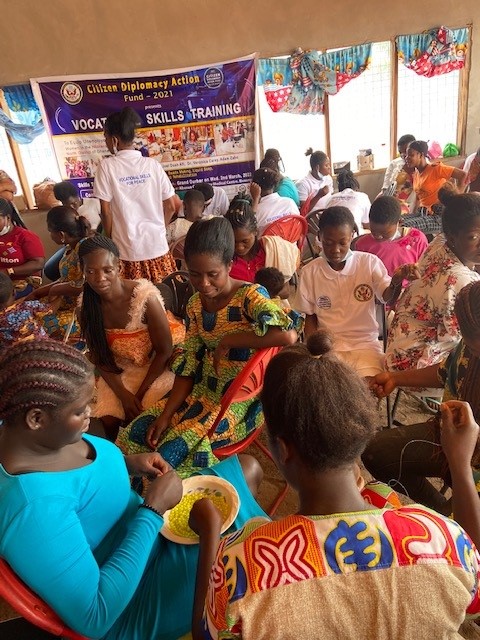Mandela Washington Fellowship Collaborations Continue: Citizen Diplomacy Action Fund
April 21, 2022
 For the last five years, Drexel University has welcomed recipients of the Mandela Washington Fellowship, the flagship program of the U.S. Department of State’s Young African Leaders Initiative (YALI), to prepare young and engaged citizen leaders to take on the challenges of the 21st century.
For the last five years, Drexel University has welcomed recipients of the Mandela Washington Fellowship, the flagship program of the U.S. Department of State’s Young African Leaders Initiative (YALI), to prepare young and engaged citizen leaders to take on the challenges of the 21st century.
The last time Mandela Washington Fellows were on campus was in 2019, before the pandemic started. Dr. Joel Duah Afi, the medical superintendent at the Kukuom District Hospital in Ghana and Dr. Sarah Furaha, a medical representative at Denk Pharma in Burundi were among that cohort, and both visited the College of Nursing and Health Professions while at Drexel.
 When Afi overheard Veronica Carey, PhD, CPRP, speaking to Furaha about broadening her reach as a mental health advocate, an idea formed. Afi, who had been engaged in community health practice particularly for maternal well-being and child welfare, recognized the issues of inequity for women with mental health diagnosis, so when he returned to his country, he approached Adam Zahn, director of Global Engagement and Carey, the assistant dean of Diversity, Equity and Inclusion, associate clinical professor and a 2021 People of Purpose honoree in the College of Nursing and Health Professions, about working together.
When Afi overheard Veronica Carey, PhD, CPRP, speaking to Furaha about broadening her reach as a mental health advocate, an idea formed. Afi, who had been engaged in community health practice particularly for maternal well-being and child welfare, recognized the issues of inequity for women with mental health diagnosis, so when he returned to his country, he approached Adam Zahn, director of Global Engagement and Carey, the assistant dean of Diversity, Equity and Inclusion, associate clinical professor and a 2021 People of Purpose honoree in the College of Nursing and Health Professions, about working together.
Zahn helped Afi apply for a Citizen Diplomacy Action Fund (CDAF) to expand upon his experiences at Drexel. Familiar with her work in psychiatric rehabilitation across the Middle East, Southeast Asia, and Sub-Saharan Africa and as a peer collaborator who stayed connected with the Fellows interested in mental health advocacy and practice, Zahn knew Carey was the perfect partner. “Dr. Carey has always been willing to go the extra mile to work with our Mandela Fellows,” Zahn said. “I had a feeling she would jump at the opportunity to be engaged in this project.”
 CDAF grants are awarded to teams of at least one U.S. and international citizen alumnus/a of a U.S. Department of State exchange program for public service projects that utilize the skills, knowledge and networks exchange alumni gained through their exchange experiences.
CDAF grants are awarded to teams of at least one U.S. and international citizen alumnus/a of a U.S. Department of State exchange program for public service projects that utilize the skills, knowledge and networks exchange alumni gained through their exchange experiences.
Carey and Zahn qualified as previous recipients of a U.S. Department of State Reciprocal Exchange supported by the International Research and Exchange Board. In 2019, Zahn and Jennifer Britton, director of communications in the Office of University and Community Partnerships, traveled to Cameroon to work with Fellow alumna, Cyrille Raingou to host a four-day workshop related to building civic engagement opportunities in education. Carey was to work with Furaha in 2020 as the lead educator to establish psychiatric rehabilitation programming in areas of Burundi to enhance the current behavioral healthcare system, however the COVID-19 pandemic postponed the project.
Afi, Carey, and Zahn developed a successful application for their project, Vocational Skills Training for Peace. This endeavor sought to equip at least 100 young, unemployed women in Busunya in the Nkoranza North district of Ghana with sustainable and self-employable vocational skills training with emphasis on women with disability and mental health conditions to serve as peace agents in the community while running their social businesses. Carey shared that that it was wonderful having 100 women, 25% of whom utilize existing mental health services in Busunya, participate in this inaugural training. “We wanted to give them language to reduce mental health stigma and have the skills, resources and supports needed to live their lives, while they learned bead- and soap-making and sewing,” Carey shared. Throughout this training, arts and culture acted as tools for peace building and conflict resolution for sustainable community development.
Before she ever stepped foot in Ghana, Carey conducted three, 75-minute virtual trainings with the same hundred women so they were familiar with what was to come. She reviewed the basics of psychiatric rehabilitation much like she does with her students here at Drexel. Practitioners of this recovery-oriented intervention believe people can grow beyond the day you meet them. So, what she teaches during these global engagements and to her students is to support individuals with a mental health diagnosis to function in the community—what Carey dubbed “staying vertical”—once an individual is stabilized. When she arrived three months later, Carey marveled at how much participants retained.
For Carey to be there for those three days of training, she was required to meet with the magistrate of health, the mayor of the town, and the tribal chief and the Queen Mother. The magistrate and tribal chief were pleased that Carey was there to work with their population, but he mentioned that they were concerned about sustainability. “I was pleased that he didn’t want this to be just one and done. That opened the door to a discussion about tiering a program which could eventually involve identifying leaders from the original 100 women and teaching them additional leadership skills to further the reach,” she explained. At Afi’s new clinic, physical health is currently the priority for the people in this remote area, however, he hopes, with Carey’s help, mental health will become as important.
Carey asserts the program goals were met. Training sessions like these are rare for African women in patriarchal societies. These 100 young women recognized this opportunity and made it their priority to attend. “When you're positioning people, these women, to have an increased knowledge base and skills to be successful in your absence, it shows that we appreciate them being there—they feel necessary, they feel needed and they feel empowered,” Carey concluded.
In the summer of 2022, Drexel will be continuing its work with the Mandela Washington Fellowship program as an Alumni Enrichment Institute for Fellows who were unable to travel to the U.S. in 2021 due to the pandemic. Zahn is excited to see what future opportunities develop to enhance Drexel’s collaborations with Fellows from the African continent.
Written by Roberta Perry and Adam Zahn